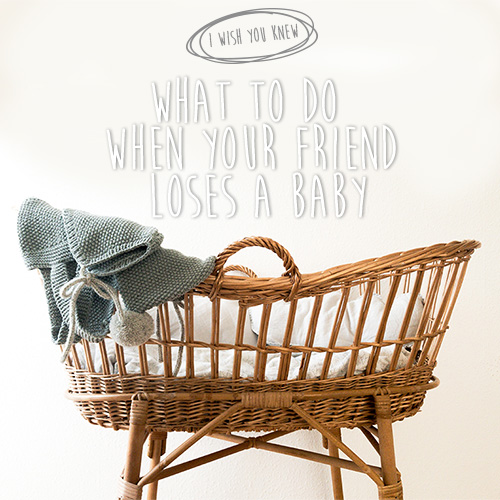What to do When Your Friend Loses a Baby
Often in our grief, those closest to us do not know how to comfort and encourage us. Sometimes they stay away or don’t say anything at all because they are afraid of saying or doing the wrong thing. In this series, we hope to better equip those around us to come alongside a grieving mother—to enter their hurt and offer hope and encouragement, or simply grieve with them.
 This past summer I was experiencing the most intense and sudden pain I’ve ever had. After an hour where I was just trying to bear it, Nate overruled and we went to the ER. After all night in the ER, we were admitted the next day and there for five days, during which we had every manner of good, bad, terrible, hopeful, and excruciating news about our pregnancy. Our faith was high after one meeting with a doctor and was crushed in the next. It was an invasive and demoralizing stay (what hospital stay isn’t?) and in the end, we ended up losing the baby and one of my fallopian tubes in surgery.
This past summer I was experiencing the most intense and sudden pain I’ve ever had. After an hour where I was just trying to bear it, Nate overruled and we went to the ER. After all night in the ER, we were admitted the next day and there for five days, during which we had every manner of good, bad, terrible, hopeful, and excruciating news about our pregnancy. Our faith was high after one meeting with a doctor and was crushed in the next. It was an invasive and demoralizing stay (what hospital stay isn’t?) and in the end, we ended up losing the baby and one of my fallopian tubes in surgery.
A few months ago our Home Group spent an evening talking about mourning. It was a strangely lively discussion in part, I think, because as western Christians we’re not very good at it and we don’t want to be. We want to be Happy Clappy Christians who bounce back quickly with the Will of God on our lips and a song of praise in our hearts. We don’t want to engage the long difficult process of mourning. We don’t want to have a formula for mourning or a plan for it. We had talked about weddings the chapter before in our book and I mentioned it was strange how much attention, dreaming, planning, and money we gladly put into weddings, but how unprepared and shocked we are when we must mourn. Yet, it’s death that’s certain for all of us, not marriage.
This could be titled What to Do When Your Friend Miscarries or Five Things to Do When Your Friend Has an Ectopic Pregnancy or Ten Things to Do when Your Friend Has a Stillborn but the truth of the matter is no miscarriage, ectopic pregnancy, or stillbirth is the same. There are varying complications, varying circumstances, varying emotions, and varying humans involved. There is no right way to approach or bless or check off deeds well done.
What should you do when the hope of a baby is crushed by loss?
First, ask your friend.
I know the old “What can I do?” question is tamped down by many well-meaning grief experts who assume answering a question is too difficult for any grieving person. But that assumes a lot of a person’s mental or emotional health. For some of us, that question is the most helpful because it doesn’t assume what works for someone else works for us.
I am never going to be a strong verbal processor. I am never going to want to cry or talk it out with more than one person. I am usually going to want some space and quiet and someone to just sit beside me on their phone or with a book who isn’t doting on me. For most of last week, one of our housemates (the female one, who was one of my roommates before I got married, and is still a good friend) came home from work every day at noon with a drink or lunch, crawled into bed with me, and we watched British bakers for hours. This was medicine for me. For someone else, though, that might feel invasive and they’d rather you just dropped food off at the door and left without a word. Or someone else might want the phone away, the tv off, and to talk for hours. Ask your friend what they need. If they don’t know what they need, ask them again tomorrow or in a week.
Second, be careful with your stories.
Sometimes it’s helpful to hear your friend talk about their friend who had six miscarriages after being infertile for six years and then had an ectopic pregnancy where they removed one of her tubes and then, miracle of miracles, birthed six babies right in a row without any complications. I can’t think of an instance in which that might be helpful to hear when you’re grieving, but maybe there’s someone out there who would love to hear that story. For most of us, though, it’s probably not helpful. What might be helpful is saying, “I’m sorry this is your story and I pray beautiful things come of it.” That sounds a bit trite, but not as trite as comparing someone else’s pain with yours.
My mom (who has had eight c-secions) texted me the other day and simply said, “Every woman’s body is different.” She didn’t try to compare her experience of having eight small living humans cut out of her body to my experience of having one small dead baby and a fallopian tube cut out of my body. She just let the stories be different because they are. Sure there are similarities of surgery and hormones and recovery and things like that, but our bodies are different. They heal in different ways and in different paces. Even the comparison of miscarriage to miscarriage isn’t helpful. Some women might hardly know they’re miscarrying, others, like myself, have seen the baby as they pass. There’s a difference of trauma there. Some might experience the emotional loss of the baby more deeply than others, some might generally bounce back quickly. Some ectopic pregnancies end in a quick miscarriage, some end with the mother’s death (the leading cause of mother’s death in the first trimester is ectopic pregnancy). How could we compare those stories in a way that is sensitive and caring? So much better to simply say to your friend something like, “I know this story isn’t what you hoped for and I’m sorry. I hate this for you. I’m praying God heals what is broken in your heart and He heals your body.”
Next, some practical things.
Line up a few meals. If your friend eats meat, include some red meat or fish. She has probably lost a lot of blood and she needs iron.
Offer to go grocery shopping for her household. Ask her if she has a normal list, but if she doesn’t, buy lots of good healthy vegetables, fruits, and meats. And ice cream.
Bring her a little basket of care. A friend brought me organic hand lotion, essential oil room spray, a face mask, flowers, and a gourmet cookie on day three of our hospital stay last week and it was the biggest blessing to me. The room spray especially since by day five our room was worse for the wear. Don’t underestimate the need for a woman in mourning to care for her body. She may be struggling with hating her body at that moment and it isn’t wrong to equip her in seeing it as a unique and beautiful thing. It will help her heal.
Schedule a cleaner for a week or two out. Here’s the one we used.
Bring her coffee or lunch.
Run errands: Make some returns for her or go to the library or take the dog to the vet or weed her garden.
Babysit her other kids for a few hours.
Essentially, your goal is to not hover around her while she’s grieving, but to simply serve her and, if she needs it, you can be near enough that she can cry or talk with you if she wants. Most of these things come naturally to folks when there’s a new baby to celebrate, but few of us care for a grieving mom in the same way. Just because there’s not a new baby to celebrate doesn’t mean there aren’t still complicated and difficult things happening in her body.
When my younger brother was killed suddenly when I was 20, I was struck by a few things: how well cared for we were in the immediate aftermath, and how long and confusing the process of mourning was. I had no rubric or understanding of grief and wasn’t sure what I was supposed to feel or when. I don’t think most of us do. This post isn’t meant to provide that either, but instead to say: Be prepared for mourning. Plan for it. Count on it. It’s a certainty as long as we live on earth. Enter into it. Don’t mourn as those who have no hope, but mourn with hope in practical ways.
*For all the lively discussion our Home Group had about mourning, they were there every single step of our hospital stay, from the ER, to the eventual surgery, to getting home and recovering. They truly know how to mourn with those who mourn.
[Post credit: Lore Ferguson Wilbert at Sayable]- Lore
Hope Mom to four babies Lore Ferguson Wilbert is a writer, thinker, and learner. She blogs at Sayable, and tweets and instagrams at @lorewilbert. She has a husband named Nate, a puppy named Harper Nelle, and too many books to read in one lifetime.
Lore Ferguson Wilbert is a writer, thinker, and learner. She blogs at Sayable, and tweets and instagrams at @lorewilbert. She has a husband named Nate, a puppy named Harper Nelle, and too many books to read in one lifetime.
Are you a writer who would like to join the blog team? Learn more and apply here.
Widget not in any sidebars



Any Kingston
October 28, 2018 (5:13 am)
Beautifully written! ❤️❤️❤️